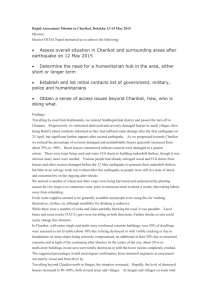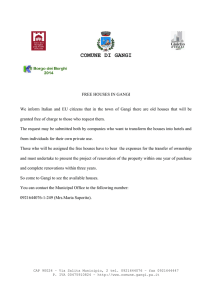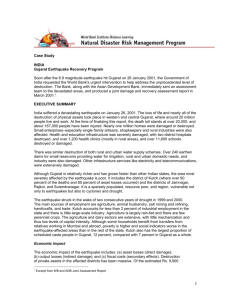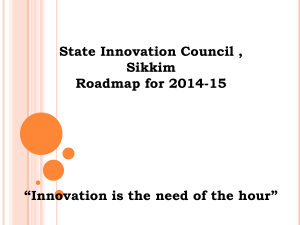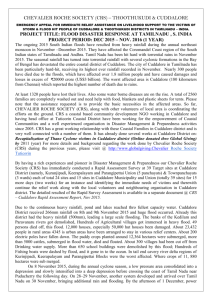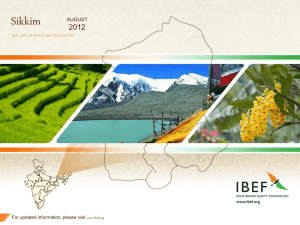REDRH SlideShow
advertisement
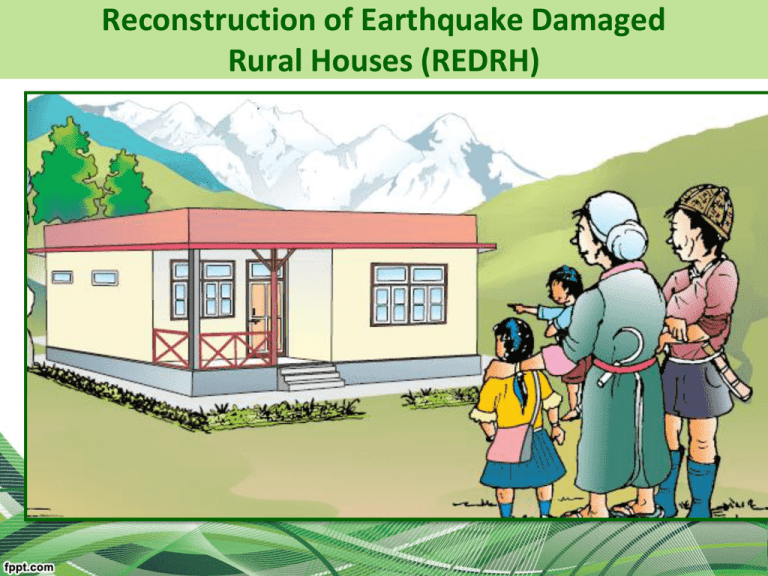
Reconstruction of Earthquake Damaged Rural Houses (REDRH) Funding support • Prime Minister’s Special Relief Package, Government of India from the Planning Commission, Government of India • Unit cost of Rs 4.89 lakh per house for 7,972 houses • Total funding support of Rs 391 crore • Project period over three financial years 2011-12, 2012-13 and 2013-2014 Why many traditional houses got damaged? • Assessment of damage: 54,000 of the total 92,000 rural houses suffered various degrees of damage, but very few casualties. • SWOT analysis: Superstructure of wooden framed houses with ekra walling and light iron sheet roof was mostly intact. But, the stone masonry load-bearing walls laid on mudmortar and not having any reinforcement suffered maximum damage to the shear forces. Private houses with RC-frame structure with brick masonry infill and iron-sheet roof performed well, showing only non-structural damage. Stone masonry load bearing walls suffered maximum damage Stone masonry load bearing walls suffered maximum damage Design of Earthquake Resistant House 4 Rooms including two bedrooms, one dining –cum- kitchen and one bathroom Stages of progress Preparing the operational framework • Operational Guidelines (47 pages) framed for the project • Cabinet approval on the operational part of the project obtained • Guidelines for management of Block Level Stores framed • Guidelines for Joint Implementation Model framed • Inspection report format of State Level Monitors notified Mason Training Handbook (English and Nepali) Reconstruction of Earthquake Damaged Rural Houses (REDRH) Before (2011) After (2013) Reconstruction of Earthquake Damaged Rural Houses (REDRH) Before (2011) After (2013) Reconstruction of Earthquake Damaged Rural Houses (REDRH) Reconstruction of Earthquake Damaged Rural Houses (REDRH) Reconstruction of Earthquake Damaged Rural Houses (REDRH) Reconstruction of Earthquake Damaged Rural Houses (REDRH) Monitoring and evaluation • Special Monitors: 29 senior officers from the Govt of Sikkim have been assigned the task of monitoring each Block along with 29 supporting officers (ACFs) • District Level Monitoring: By District Level Committee headed by the District Collector • Web based MIS: With the support from the Department of IT, Government of Sikkim a web-based MIS has been developed inhouse with a backend database which has modules like beneficiary selection, physical progress, financial progress and e-stores. Web Based MIS www.sikkimrmdd.gov.in Progress update • Physical progress: 3,000 houses are under various stages of construction, with 1000 slated for completion by March-April 2013 • Financial progress: – Total sanctioned budget is Rs 391 crore – Total expenditure (till date) is Rs 120 crore • 2011-12 : Rs 20 crore • 2012-13 (till date): Rs 100 crore Steps taken to accelerate the project • • • • • Joint Implementation Model : Other than the Departmental model of implementation, the Joint Implementation Model has also been made available by revising the guidelines to enhance the role of the beneficiaries and transferring funds to them directly in instalments after achieving predetermined milestones. Concurrent Monitoring : Senior Officers of the rank of Special Secretary assigned as Special Monitors to monitor this project closely and carry out independent inspections. They have been submitting their reports on a regular basis Supplementing technical manpower: The RMDD has appointed 24 JEs during June 2012 with funding support from the State Plan and posted them to the Blocks. Web based MIS has been developed inhouse by the Department of IT, Government of Sikkim 29 Store Keepers designated on additional charge to specially manage the stock material at the Block Level Thank You
